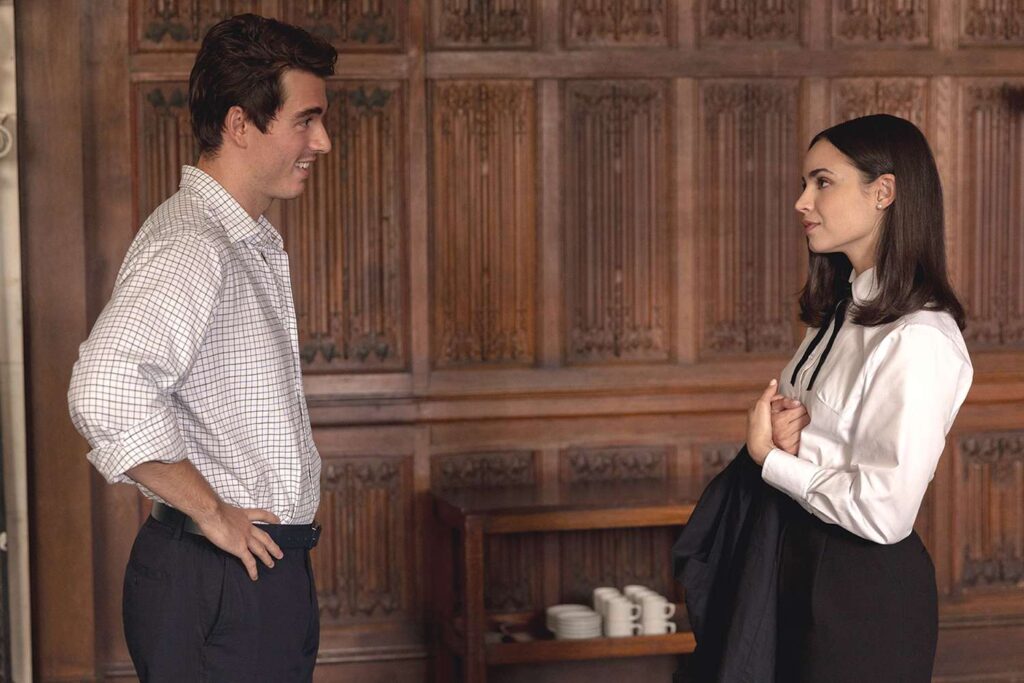My Oxford Year : Netflix’s My Oxford Year—adapted from Julia Whelan’s bestselling novel and starring Whelan herself—has captivated audiences with its poignant blend of intellectual charm and heart-wrenching romance. Set against the dreaming spires of Oxford University, the film explores love, mortality, and self-discovery through the eyes of Ella Durran (Whelan), an ambitious American Rhodes Scholar. As searches for “My Oxford Year Julia Whelan” surge globally, let’s dissect the film’s magic, its controversial ending, and why Whelan’s dual role as author/actor makes this a modern classic.
The Premise: Love, Literature, and Life Lessons – My Oxford Year
Ella Durran (Julia Whelan) arrives at Oxford on a Rhodes Scholarship, ready to conquer academia. Her life pivots when she falls for Jamie Davenport (Sam Reuben), her enigmatic literature professor. Their whirlwind romance—punctuated by poetic banter and cobblestone strolls—hits a devastating snag: Jamie is secretly battling terminal cancer. Adapted from Whelan’s 2018 novel, the film balances wit and sorrow, dissecting whether love can thrive under the shadow of mortality.
Julia Whelan: From Author to Screen Icon – My Oxford Year
Whelan, a former actress (Once and Again) turned award-winning audiobook narrator, does triple duty here: author, screenwriter, and star. Her meta-journey mirrors Ella’s resilience. As The Guardian notes, Whelan’s performance is “a masterclass in subtlety,” capturing Ella’s transition from idealism to hardened grace. This authenticity stems from Whelan’s deep connection to the material—she penned the novel as a love letter to Oxford after her own postgraduate stint.
My Oxford Year : The Silent Protagonist
Oxford University isn’t just a backdrop—it’s a narrative force. Scenes filmed at Bodleian Library and Christ Church College mirror Ella’s internal shifts: gothic arches frame her joy, while rainy quads echo her despair. As Oxford University’s official site notes, the city’s “weight of history” amplifies the story’s themes of legacy and impermanence.
The Ending Explained: Love Beyond Loss
The climax diverges from the book, polarizing fans. In the film:
-
Jamie’s Death: Jamie succumbs to cancer post-surgery, rejecting a risky trial. Ella fulfills his wish, scattering his ashes in Scotland.
-
Ella’s Choice: She declines a high-profile political job, opting to teach poetry at Oxford—honoring Jamie’s belief that “art outlives us.”
-
The Final Twist: Ella inherits Jamie’s estate, discovering unpublished poems dedicated to her. She reads them aloud in his empty classroom, cementing her healing.
Time calls the ending “bittersweet but defiant,” arguing Ella’s return to Oxford isn’t resignation—it’s reclaiming agency through grief. Whelan defends this choice: “Ella isn’t giving up; she’s choosing meaning over prestige.”
Themes: Why the Story Resonates
-
Love as Catalyst: Jamie’s illness forces Ella to abandon perfectionism. Their love isn’t fairy-tale escapism—it’s a crash course in vulnerability.
-
Grief as Growth: Ella’s decision to teach symbolizes carrying Jamie’s legacy forward, transforming pain into purpose.
-
Literature as Lifeline: Poetry (from Rilke to Donne) becomes their shared language. Whelan told People, “Words are how we make sense of the senseless.”
Critical Reception: Praise and Pitfalls
While the film holds an 89% Rotten Tomatoes audience score, critiques exist. The Guardian lauds its “emotional intelligence” but questions the “rushed third act.” Still, Whelan’s screenplay shines, avoiding melodrama by grounding tragedy in quiet moments—like Jamie’s confession scene, shot in a single take.
Julia Whelan’s Real-Life Oxford Connection
Whelan studied English at Oxford in 2002, an experience that inspired the novel. In interviews, she admits Ella’s journey mirrors her own: “Oxford cracks you open. You either rebuild or retreat.” Her transition from author to actor adds authenticity; as Whelan’s IMDb notes, she’s the first author since Sylvia Plath to star in her own adaptation.
Why You Should Watch
My Oxford Year transcends romance tropes by asking: How do we love when time is stolen? Whelan’s answer—through art, honesty, and honoring the ephemeral—makes this a standout. As Ella whispers in the finale: “Some loves are seasons. Others are lifetimes.”
For deeper dives, read Whelan’s novel on Goodreads, or explore Oxford’s Rhodes Scholarship program.
Final Takeaway
Julia Whelan’s My Oxford Year isn’t just a tearjerker—it’s a meditation on how love reshapes us, even in loss. With its intellectual depth, powerhouse performance, and haunting ending, the film secures Whelan’s place as a multihyphenate force. As searches for “My Oxford Year Julia Whelan” soar, one truth emerges: great stories, like true love, never truly end.


